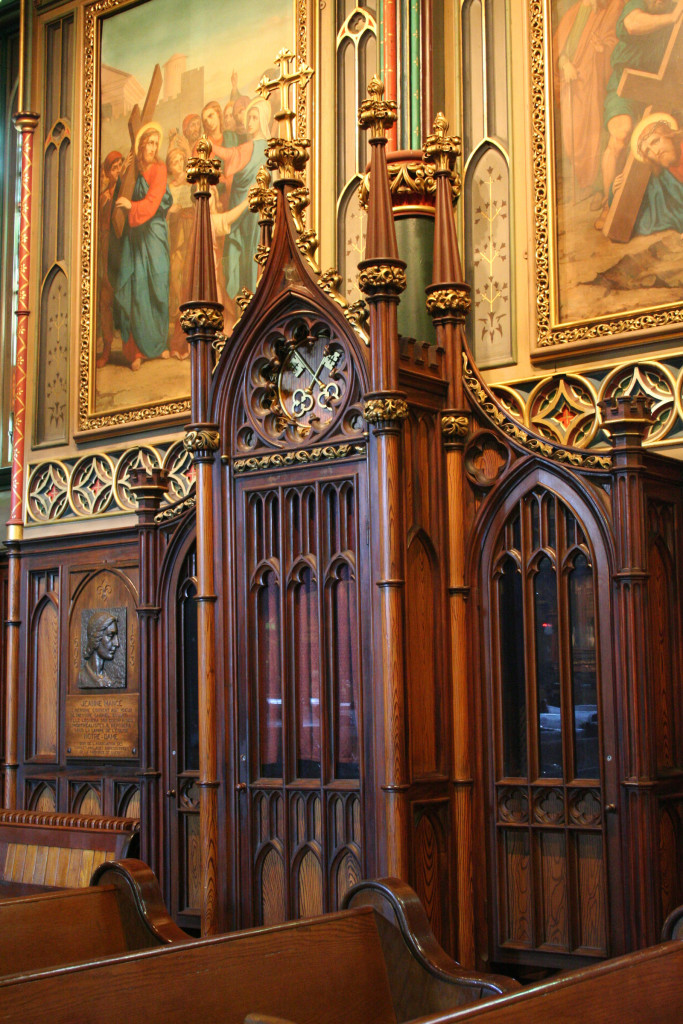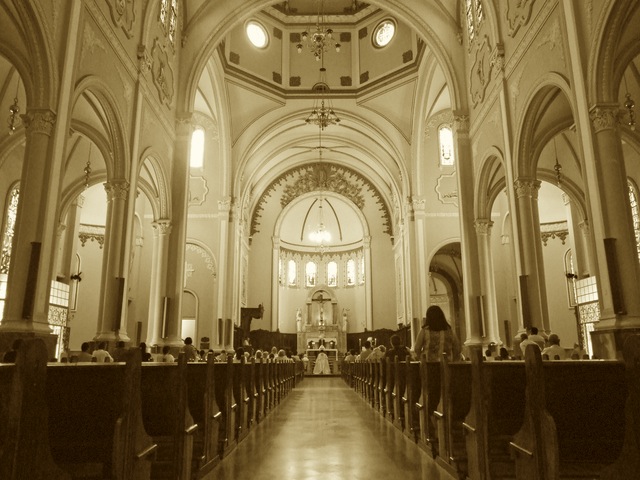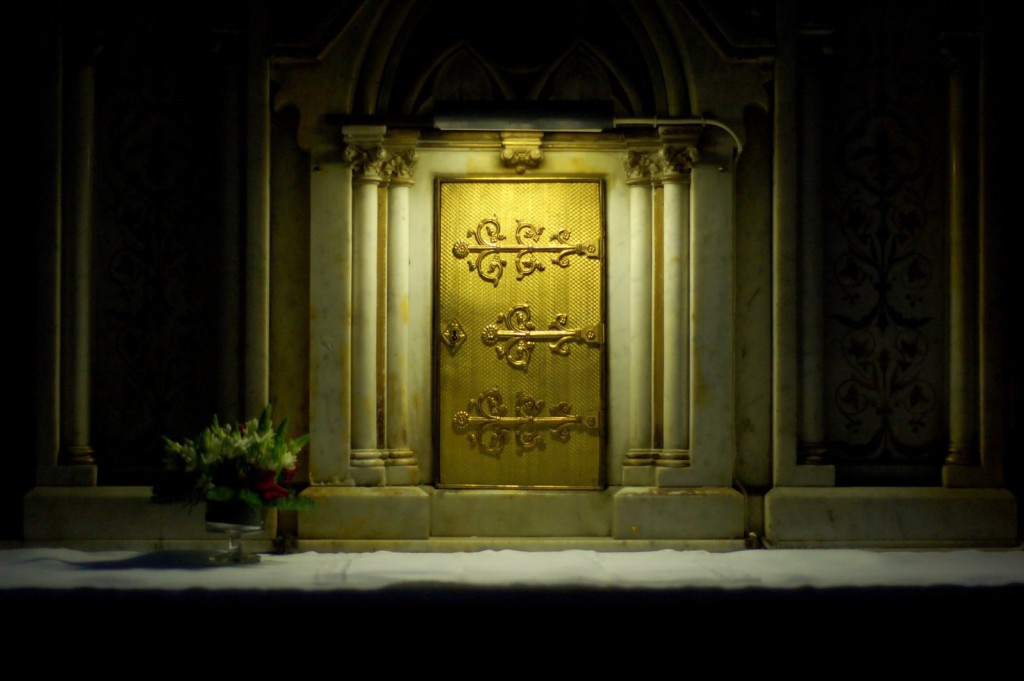The readings today are so beautiful, and unlike many days, there is actually a pretty clear connection between the first reading, the psalm, and the Gospel. (Obviously the readings are always chosen for a reason, but most times it’s a little harder to spot how they relate to each other.) The theme in our liturgy today is twofold: making known the glory of God and inviting others to experience this glory for themselves.
It begins with the entrance antiphon,
Proclaim the salvation of God day by day;
tell among the nations his glory.
Cf. Ps 96 (95): 2-3
Then in our first reading from Revelation, we hear the angel’s invitation,
“‘Come … I will show you the bride, the wife of the Lamb’”(21:9).
This is a direct reference to the Church, the Bride of Christ. It is through the Church, specifically in the Sacraments, that we experience God’s glory most fully. In this experience, we are drawn to a deeper love of the Lord — and the appropriate response should be to proclaim His glory and invite others to come, so that we may show them the splendor of the Bride, the Church, the place of encounter.

The psalm only confirms this, stating very clearly how we are called to respond as we ourselves come to know, more and more, the glory of God:
“Your friends make known, O Lord,
the glorious splendor of Your Kingdom.
Let all your works give you thanks, O LORD,
and let your faithful ones bless you.
Let them discourse of the glory of your Kingdom
and speak of your might.”
In other words, we, as His friends, as His “faithful ones,” are meant to thank and bless God because, again, this is the proper response to His Glory. And as we frequent the Sacraments, His glory becomes familiar to us. If it doesn’t, we shouldn’t be afraid to pray for the outpouring of the Holy Spirit in our lives, that we might experience this glory more, so we can then “make known” His “glorious splendor.” My point is this: in order to “make something known” to others, we must first know and love it ourselves, so that it becomes exciting to us and we feel compelled to share it with everyone. And each time we open ourselves up to His presence, we encounter His glory and come to know and love Him more.
This is exactly what happens in our Gospel today. Philip is found by Jesus, meets Him, and is so moved that he leaves everything to follow the Lord. But he can’t keep it to himself — His encounter with Christ is so profound that he immediately goes and tells Nathanael (aka Bartholomew, our saint for today), all about Jesus. And when Nathanael doubts the authenticity of Philip’s experience, Philip simply invites him to “Come and see,” and brings Him to the Lord.
We, too, must be “Philips” to those around us. Our lives ought to be lived in a way that welcomes and invites those we meet to “come and see” the glory of the One who has so deeply affected us. Ideally, they will notice God’s glory in us and our way of life, be attracted to it, and desire it for themselves. And the more we experience this God of ours personally, the more we will learn to live and love the way He does, and we will begin to long for everyone else we know to experience Him too.
 We learn how to live as those marked by glory in two ways. First, we should be continuously praying for the grace to encounter the Lord in an ever deeper way through the Sacraments of the Church, so that we are equipped to proclaim and invite others into the family of God. And this means also asking for humility so that, when we do these things, we don’t come across as pushy, self-righteous, or arrogant. We must remember that the Church is “a field hospital” as Pope Francis has reminded us, and the reason we’re in it is because we’re weak, wounded, and diseased by sin. In other words, just because we’re Catholic, doesn’t mean we’re “better,” or “more enlightened,” it just means we’ve realized that we’re sick and we’ve taken up residence in the place of healing. And experiencing that, we should want others to recognize that they are ill and in need of healing too.
We learn how to live as those marked by glory in two ways. First, we should be continuously praying for the grace to encounter the Lord in an ever deeper way through the Sacraments of the Church, so that we are equipped to proclaim and invite others into the family of God. And this means also asking for humility so that, when we do these things, we don’t come across as pushy, self-righteous, or arrogant. We must remember that the Church is “a field hospital” as Pope Francis has reminded us, and the reason we’re in it is because we’re weak, wounded, and diseased by sin. In other words, just because we’re Catholic, doesn’t mean we’re “better,” or “more enlightened,” it just means we’ve realized that we’re sick and we’ve taken up residence in the place of healing. And experiencing that, we should want others to recognize that they are ill and in need of healing too.
Secondly, our Lady has the power to give us all the grace we need to help us proclaim and invite, as well as come to know the Lord and become more aware of our own sinfulness. She is also, as Mother and Bride, a symbol of the Church and has been referred to as the “Hospital of sinners.” This week, in fact, we celebrate the beautiful memorial of Our Lady, Health of the Sick. This title of Mary is not reserved only for those who are physically ill, but rather for all of us who are wounded by sin.
So as we begin our week, let us ask St. Bartholomew and Our Lady, Health of the Sick, to lead us to a deeper experience of the Lord in the Sacraments of the Church, to teach us how to proclaim His glory, and to obtain the grace to live our lives in a way that reflects how we have been changed by Him, so that we might reveal Him to all those we meet, inviting them to a personal encounter with the living God.
“Nowhere does the Gospel say, ‘Go away,’ but always ‘Come to me.’”
Blessed Mother Teresa



